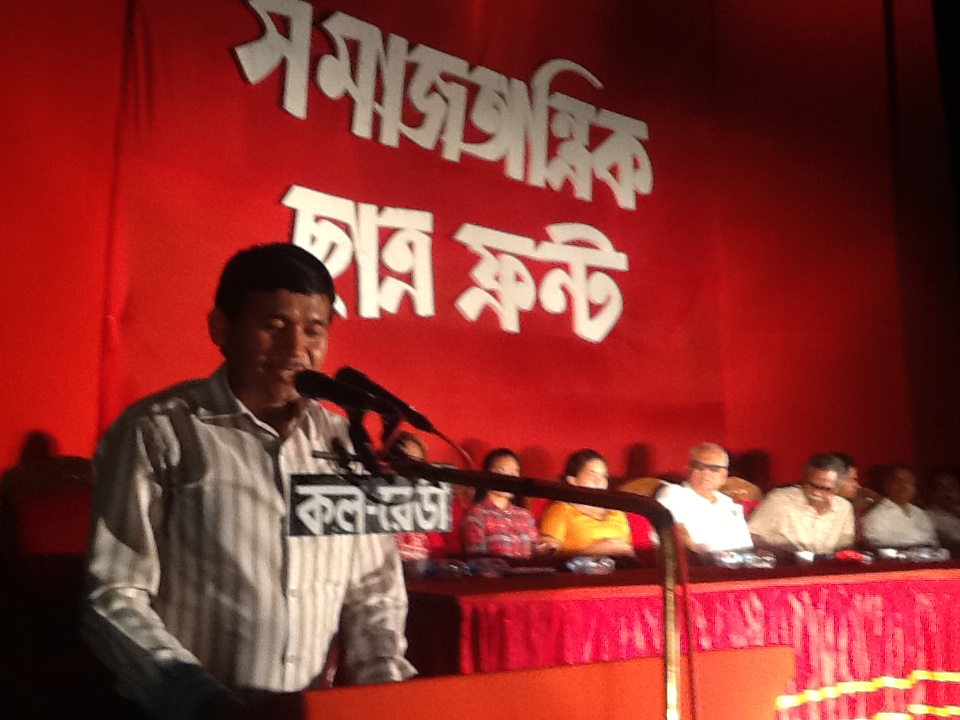Opening Ceremony of SSF 4th Conference, Dhaka Bangladesh

Dear Comrades,
Respected Chairperson of the Session, Distinguished Chief Guest, Honored Guests, Representatives, Ladies and Gentlemen,
I extend to you my heartfelt red salute from Nepal.
I am deeply honored to be here today and to address this historic conference. The ANNISU (Revolutionary) and the Socialist Students’ Front, Bangladesh, have long worked together in the struggle for the rights of the world proletariat. I feel immense pleasure in attending this glorious opening session. I am equally indebted to my seniors, Comrade Lekhnath Neupane, former Chairperson, and Comrade Gopal Neupane, who attended the silver jubilee celebration in July 2010 and the previous year’s session, respectively, representing our union.
On behalf of the Central Committee of ANNISU (Revolutionary) and also personally, I would like to extend my warm congratulations on the grand success of the 4th National Conference of the Socialist Students’ Front, Bangladesh. I also express the solidarity of the oppressed Nepalese people with the proletarian movement of Bangladesh.
In the past year, Nepal has faced three major political and social events: the devastating earthquake, the promulgation of a new constitution, and the unjustifiable blockade imposed by India against Nepal and its people.
The earthquake of April 25, 2015, killed 8,664 people, injured more than 22,000, and caused massive destruction of property worth around 66.7 billion Nepali rupees, including schools, hospitals, and religious heritage sites. It severely hampered the country’s entire socio-economic process. Reconstruction and relief became the nation’s prime concern, and Nepal demonstrated unprecedented unity during this time of crisis. Our party, the UCPN (Maoist), under the leadership of Chairman Comrade Prachanda, showed strong leadership in addressing these challenges. Our union, ANNISU (Revolutionary), mobilized thousands of volunteers for rescue, relief distribution, rehabilitation, and reconstruction programs — efforts which are still continuing.
The 19-day People’s Movement of March–April 2006, built upon the foundation of the 10-year-long People’s War, established the Constituent Assembly. This assembly brought about historic political changes — the abolition of the monarchy, the establishment of a republic, and the promulgation of a new constitution on 20 September 2015.
The new constitution adopts a federal structure with seven states, a secular state, gender equality, and proportional representation of oppressed groups regardless of ethnicity, religion, gender, or class. It defines education, health, employment, and food sovereignty as fundamental rights of the people. Importantly, it declares Nepal as a socialism-oriented state in its preamble. Thus, we can say that the fundamental goals of the People’s War to establish a capitalist democratic society have been uniquely achieved.
Today, Nepal’s political task is to safeguard national integrity and sovereignty while advancing toward socialism — fighting against bureaucratic and comprador capitalism, serving the oppressed masses, and eradicating the residual roots of feudalism within a socialist framework.
However, Indian expansionism, which previously micromanaged Nepal’s politics, was unable to play such a role during the constitution-making process. In retaliation, India imposed a blockade against Nepal to punish our assertion of sovereignty. Fuel, food, and medicine supplies were halted, creating a humanitarian crisis and severely damaging Nepal’s economy. Strong resistance from the people of Nepal, combined with international condemnation, forced India to step back from its unjustifiable blockade. Yet, its effects linger in the form of inflation, black marketing, and shortages of essential goods, while agents and smugglers exploit the situation. In response, ANNISU (Revolutionary), together with other student organizations, is leading protests to raise awareness and pressure the government.
The constitution has enshrined education as a fundamental right, which is a matter of pride for us. However, privatization, commercialization, and corruption in education have weakened Nepal’s public education system, deepening class divides. Our union strongly demands new legislation to abolish privatization and commercialization in education and to ensure free, scientific, and quality education for all. Although the constitutional recognition of education as a fundamental right is an achievement, we must still struggle against discrimination in education and work to establish a socialist education system.
Privatization and commercialization of education is not only a national issue but also a global challenge. Donors such as the World Bank, ADB, and IMF have intruded into education, imposing conditional aid and loans. This creates a new form of imperialism in education — a form of neo-colonialism. Developing countries like Nepal and Bangladesh are its victims. I express my strong solidarity with the struggle against this neocolonialism, discrimination, and exploitation.
Finally, I wish this convention great success. May it elect a strong leadership capable of addressing the challenges faced by Bangladesh and the broader international student movement.
Long Live ANNISU (Revolutionary)!
Long Live Socialist Students’ Front!
Red Salute to the Great Martyrs!
Thank you.